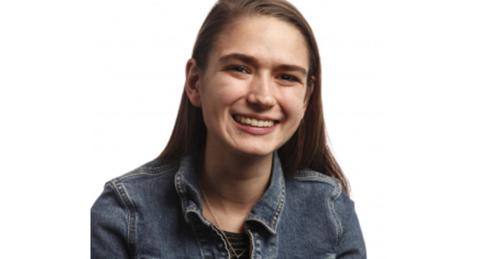
One of Caitlin Burnett’s ’20 fondest academic memories is taking Ethnographic Methods with Dr. Svetlana Peshkova. The professor told the class to find a tree in College Woods and describe it in every way possible. Caitlin not only felt and observed a tree, but also tasted it by eating a piece of bark. “If you’re a researcher, you can’t just observe; your whole body needs to be in it,” she laughs. It is clear that Caitlin’s enthusiasm for data collection and zest for new experiences knows no bounds. These qualities have taken her thousands of miles from her small hometown, though she has never strayed too far from her roots.
Caitlin is the eighth generation on her family farm in Conway, MA, a town of 2,000 people and no stoplights. She is the first in her family to go to college and came to campus not knowing anyone, only having second-hand information about the college experience. “I was the only person who didn’t know someone at UNH.” Many times, it was an isolating experience, Caitlin found. She also viewed it as an opportunity to learn to be self-sufficient and to forge her own path.
In just one conversation, one can easily see that Caitlin is a storyteller, and the vibrancy with which she describes her UNH experience is unparalleled. It is no wonder that she has translated this skill into her research. Caitlin married her dual majors of anthropology and sustainability and traveled abroad to Bhutan after her freshman year to research the cultural effects of climate change. During her time overseas, she collected stories of how rural farmers were being impacted. “So much of our work focused on how storytelling and different ways of knowing can be used to communicate about environmental issues.” These stories were used to share culturally relevant solutions for the “people and the planet in ways that make sense for both of them.” Bringing life to her findings, she produced a podcast to make the information readily accessible to those who may not have an eye for scientific research. “Podcasting lets people tell their own stories in their own voices, which was important for us in helping to ensure as much equity in our work as possible.” Since then, she has expanded her research to Goa, India.
One of the biggest challenges for her has been to bridge the gap between her home and college lives. She wanted to share her experiences with her family and friends back home but felt those stories did not translate to her home community. However, Caitlin recalls the day her aunt visited campus during her sophomore year. Rather than just pointing out buildings, she found herself referencing her favorite study spots and the places she hung out with friends. It was the “a ha!” moment when she realized she truly had begun to create her own story on campus.
Eventually, Caitlin found a way to connect home and college by applying her research and storytelling skills in her hometown. Not wanting to waste any free time in the summer, Caitlin asked herself, “How can I use at home what I’m learning at school?” The answer was to work on a grant-funded project with her father and the Conway Historical Commission to map the old roads and foundations of her hometown. She conducted oral histories with older residents on the town to piece together historical data about its lost infrastructure. Most importantly, the project gave her family a glimpse of her experiences as a college student.
It is hard to imagine that, on top of her dual major, study abroad experiences, and research projects, Caitlin has time for extra-curricular activities. Nevertheless, she has found community at The Waysmeet Center and with the Student Environmental Action Coalition, Anthropology Club, and Socratic Society. She also became involved with the Indigenous NH Collaborative Collective, which aims to reframe New Hampshire’s history from an indigenous perspective. This group is implementing a curriculum in schools emphasizing that “indigenous people are still here and very much part of our history.” Caitlin stresses the collaborative nature of this group saying, “For the first time, I felt less like a student working for a professor, and more like a partner in a process.”
Although she’s a junior, Caitlin has a clear picture of what post-graduation looks like: joining City Year and eventually attending graduate school. However, when asked what she hopes to be doing in ten years’ time, she simply stated, “I want to be doing something that is at the intersection of all of the things I’m passionate about, and that is ultimately improving the world.”
Profile Source: Create Your Own Story Website